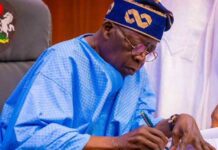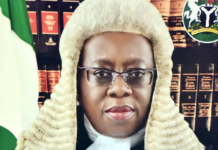In this report, Ise-Oluwa Ige examines issues and politics surrounding the recent removal of the Chief Judge of Osun State, Justice Oyebola Adepele-Ojo from office and infers that going by judicial precedents, the embattled state chief judge should ordinarily come back from the NJC unscathed, the peculiar nature of the facts of the matter however makes the case dicey.
Background
On June 8, 2023, President Bola Ahmed Tinubu signed into law a bill on uniform retirement age for judicial officers in the country.
The bill was the first to be signed by President Tinubu after he took his oath of office on May 29, 2023.
The law extends the retirement age of high court judges — and others — from 65 to 70 years.
The retirement age of justices of the Appeal Court and the Supreme Court was already pegged at 70.
The legislation also ensured uniformity in the pension rights of judicial officers of superior courts of record specified in section 6(5) of the 1999 constitution (as amended).
But for the legislation, many judicial officers at the high court bench nationwide would have, by now, retired from service for clocking the mandatory retirement age of 65 years while others would be counting days now.
One of the beneficiaries of the legislation in the country is the Osun State Chief Judge, Justice Oyebola Adepele Ojo.
Ms Ojo was born in October 1958 and was due to bow out of the state high court bench in October 2023, but the new legislation elongated her tenure by five years.
Issues surrounding Justice Ojo’s elevation
Vanguard recalls that there were issues around her elevation as the state chief judge in 2013 after her predecessor, Justice George Olaniyi Ojo, retired from the bench, as the state House of Assembly rejected her candidature.
But Justice Oyebola Adepele Ojo though was appointed as Acting Chief Judge on March 5, 2013, she got confirmed as the first female Chief Judge of the state on June 17, 2013.
The Speaker of the state House of Assembly at the time, Najeem Salaam, said her eventual confirmation was based on seniority, adding that her earlier rejection was because of the pending legal action on the issue.
Mr. Salaam had advised Ms. Ojo to “promote substantive justice over technicality and to allow justice roll down like water and righteousness, like a mighty stream’’.
He said the judiciary must be united and act as one body to fight crime and corruption.
He advised her to work with other judges for enthronement of justice and maintain the name of judiciary.
Mr. Salaam advised the new chief judge to digitalise the judiciary and cooperate with the state government to move the state forward.
In her response, Ms. Ojo pledged not to discharge her duties with fear, affection or ill will as well as to promote justice and equality to all in the state.
Justice Ojo’s scorecard
As soon as the chief judge settled down to work in 2013, all was working well in the state’s third arm of government while the relationship between the judiciary, the state House of Assembly and the executive was rosy.
Although, towards the end of the tenure of the immediate past state governor, Mr Gboyega Oyetola, Justice Ojo had been having running battle with some of the state High Court Judges and Magistrates over her alleged high-handedness.
Available information obtained from staffers who preferred anonymity showed that the chief judge, was purportedly not fair to some Muslim Judges and Magistrates in particular and was said to be responsible for the religious division in the state judiciary.
According to a top officer of the state judiciary who spoke with Vanguard, she said not too long after she became the chief judge, Muslims and Christians would go to the mosque and church together during the annual legal year programme but that things had changed now because of the division allegedly introduced into the system by the Chief Judge.
Besides, another senior staff of the judiciary also said there were also a couple of incidents of abuse of power and office by the CJ and that she was not listening to advice.
Indeed, a civil society organization, Citizens Communication and Advocacy Centre, was one of the first sets of persons (individual and corporate) that documented her purported sins in a petition.
The Judiciary Staff Union of Nigeria (JUSUN) after diplomacy failed, also dragged the chief judge before both the state House of Assembly and the National Judicial Council (NJC).
In the petitions by the organisations to the Osun State House of Assembly and the NJC, for instance, it was claimed that the state judiciary was stinking under the leadership of Justice Ojo.
According to the groups, the chief judge purportedly diverted a sum of N7.5m recovered from some condemned persons involved in the widely reported Ikirun Bank robbery in the state.
Specifically, the group alleged that the trial judge in the robbery case ordered that the sum recovered from the convict must be paid into the account of Osun State Government but that the chief judge directed that the money should be paid into the account of the state judiciary where she is an accounting officer.
The group also alleged that some staff of the Osun Judiciary were unilaterally suspended by Justice Mrs Adepele-Ojo in 2019, without any recourse to the State Judicial Service Commission (JSC) for more than four years, while salaries and allowances of the affected staff were paid into an unauthorised special account without notifying the state government paying the salaries.
It was further alleged that even though some of the suspended staff faced several panels, including the ICPC which exonerated them, the Osun Chief Judge refused to lift the suspension on them against known administrative principles.
The group also said that another set of staff of the Osun State Judiciary were arrested, investigated and prosecuted in 2020 over alleged stealing of office materials and that the staff were later discharged and acquitted by court but that the judge disobeyed court verdict which ordered their reinstatement and restoration of their salaries and allowances.
Besides, there were also allegations that the chief judge also purportedly diverted funds (N1million monthly) for the State Judiciary Library meant for purchase of law reports/books (except newspapers) into the Library since 2015; robe allowance of a brother judge of the Osun State High Court which is about N5, 000,000: 00 (Five Million Naira); a four million naira monthly security cost being provided by the State Government on the security of the High court, #3.6m monthly which the High Court of Justice under the watch of the Chief Judge is collecting for uniforms and clothing and alleged diversion of revenue due to the government from filing electronic affidavits through the sole appointment of a consultant by the Chief Judge.
According to the petitions, the consultant makes N1000 on an affidavit as against just N250 that is being remitted to the state coffers.
The petition also said that Justice Ojo’s administration rarely regularizes appointment of staff while the court infrastructure is crying for attention.
Politics
Although all these issues were there against the chief judge during the tenure of the immediate past state governor, the good relationship between the judiciary and the two other arms of government was still intact.
However, the gubernatorial election that held in the state last year altered political calculation after the candidate of the opposition Peoples Democratic Party (PDP), Senator Ademola Adeleke polled over 400,000 votes representing about 50% of the votes cast to beat Mr Gboyega Oyetola of the All Progressive Congress (APC) who garnered around 375,000 votes representing over 46% of the votes cast in the election.
The litigation that trailed the poll results, according to an impeccable source at the Osun White House, created a crack in the relationship between the executive and the judiciary following allegation that Justice Ojo purportedly played a middle-man role between some leaders of the All Progressives Congress (APC) and the tribunal panel to get a favourable judgment for Oyetola.
According to a White House source, the administration of Governor Adeleke was no longer comfortable with the Chief Judge’s continuous stay in the service after President Tinubu signed into law a bill on uniform retirement age for all judicial officers in the country which extended the tenure of office of Nigerian judges including Justice Ojo from 65 to 70 years.
A cabinet member of the Adeleke administration told Vanguard that the government wanted the CJ out of office at all costs.
The source said that both the PDP-dominated executive and the state House of Assembly did not waste time when petitions came against the chief judge as the state lawmakers hid under sections 128 (2) (b) and 129 of the 1999 Constitution of the Federal Republic of Nigeria to set up a panel to probe the chief judge and recommended her suspension to the governor.
But before the state house of assembly would finish with her probe, the chief judge had approached the National Industrial Court in Ibadan with an exparte motion through her counsel, Oladipo Olasope to secure an order stopping her removal from office.
Apart from Adeleke, other defendants in the suit marked NICN/IB/61/2023 filed on Wednesday include the attorney-general of Osun, Osun State Judicial Service Commission and the accountant-general of the state.
In the motion dated November 15, 2023, the plaintiff specifically sought and got an order of interim injunction restraining the defendants by themselves or their agents or privies, however so called from interfering with, removing, reversing or terminating the appointment and conditions of service of the claimant as the Chief Judge of Osun State, including but not limited to salaries and other pecuniary benefits, pending the determination of the interlocutory application, a request that was granted.
The court also directed the governor to fortify security around Justice Ojo to protect her from all forms of harassment, pending the determination of the suit filed before the court.
But notwithstanding the order of the court, Osun State House of Assembly recommended the Chief Judge’s suspension based on the allegations against her, and its resolve to fight corruption in the state while the governor okayed the recommendation by suspending the chief judge.
But following harsh criticisms against the step taken, the state governor backtracked and denied ever suspending the chief judge while the governor quickly sent petitions alongside report of the state lawmakers against the chief judge to the NJC for necessary action.
Meanwhile, members of JUSUN who accused the chief judge of victimizing its members have paralyzed judicial activities in the state.
Chief judge replies governor, lawmakers, says they are wasting their time
All efforts to speak with the chief judge proved abortive while messages sent to her phone were not answered.
However, counsel to the Chief Judge, Mr Oladipo Olasope, SAN, described the corruption allegations against his client as a figment of the assembly’s imagination.
Olasope who absolved Justice Adepele-Ojo of all the allegations, said, “Who are they to be querying the CJ? Disciplining the CJ does not lie with the Osun State House of Assembly.
“Section 292 of the Constitution is very clear. It is the NJC who can discipline a CJ, not the House of Assembly. So, all those allegations are figments of their own imagination. They have to say something to justify their position and that is what they choose to say.
“They are putting the cart before the horse. After you asked the woman to step aside, you are now bringing up charges and allegations. Why not bring the allegations first, try her, if you find her guilty, and then send it to the NJC and the NJC will now decide,” he had added.
Precedents
But Vanguard’s checks with the National Judicial Council (NJC) showed that indeed JUSUN had written a petition against the state chief judge while the report of the state house of assembly which investigated the chief judge is with the Council.
But a top source at the NJC told Vanguard that nothing may come out of the petition and the assembly’s report because neither the state house of assembly has powers to investigate a serving judge nor the state governor has powers to remove an erring chief judge as done in the state.
The source however confirmed that the matter would be considered at the meeting of NJC scheduled to hold between Wednesday and Thursday, this week.
The source alluded to the decision of the Supreme Court in a similar case involving Justice Raliat Elelu-Habeeb vs NJC and others with registration Number SC.281/2010 where the apex bench held that members of Kwara State House of Assembly were wrong in probing and suspending Justice Habeeb from office without a recourse to the NJC and quashed the suspension.
The source said a full panel of seven justices of the Supreme Court including a former Chief Justice of Nigeria, Justice Mahmoud Mohammed, Justice Walter Onnoghen, Justice Chukwuma Eneh, Justice Coomasie, Justice Olufunlola Adekeye, Justice Mary Odili and Justice Kayode Ariwoola decided the matter on February 17, 2012 in favour of the judge and that the law has not changed.
The source added that similar thing happened in 2008 in Sokoto State when the state house of Assembly suspended the state chief judge, Justice Sani Dahiru, but that the court also held that the lawmakers had no such powers.
The source also reminded Vanguard of what happened in October 2016 when men of the Department of State Service (DSS) raided the homes of seven judges in six states of the federation and the Federal Capital Territory between Friday night and Saturday morning with some of the arrested judges arraigned but that the court could not try them over failure of the DSS to make a recourse to the NJC before moving against them in court.
“All I can tell you is that from practice, the NJC will write the Assembly or and the governor to say that they do not have powers to suspend or remove a sitting judge without a recourse to the NJC.
“NJC will continue to recognize the embattled chief judge of the state and will continue to pay her salary and allowances due to her,” the source said, adding, “but let’s wait for the NJC to act on the petition.”
The source however added that given the peculiar facts of the case as they relate to the executive governor denying suspending the judge, the case may be said not to be on all fours with the above cited cases and may yield a different find.
Source: Vanguard










